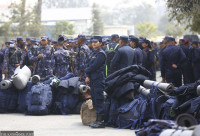National
In Romania, hundreds of Nepalis forced to take unpaid leave, pay cuts
The southeastern European country hosts around 3,000 Nepalis, most of whom work in the hospitality and construction sectors..jpg&w=900&height=601)
Chandan Kumar Mandal
Nearly 500 Nepali migrant workers in Romania have been forced to either stay at home without pay or take pay cuts as the Covid-19 pandemic wreaks havoc in Europe.
Businesses that employ Nepali workers in the southeastern European country, which has been in lockdown since March 25, were initially planning to cancel the permits of foreign employees for sometime, but later agreed to send them on unpaid leave, said a representative from Nepal Association of Foreign Employment Agencies, an organisation of 760 recruiting agencies.
“We were informed about the discussion [among businesses] that was happening,” said Sujit Shrestha, general secretary of Nepal Association of Foreign Employment Agencies. “The Honorary Consul of Nepal for Romania also discussed the matter with local employers and reached an understanding that Nepali workers would not be made to return home.”
Nepali workers have been staying on unpaid leave after the hotels and restaurants have been shut down for an indefinite period due to the Covid-19 outbreak.
As of Sunday, over 3,600 cases of Covid-19 have been reported in Romania with 146 deaths. A record number of 445 patients tested positive for the new coronavirus on Friday.
Following the understanding between the consul and the hospitality sector employers, Nepali workers can continue to stay in Romania, and employers will provide food, accommodation, electricity, water, room heater and access to the internet, according to Shrestha.
Romania has emerged as one of the popular destinations in Europe for Nepali migrants because of the high minimum wage in the country. A 2018 policy adopted by the Romanian government made it easier for local employers to hire foreign workers after the country faced a shortage of workers. According to Shrestha, Romania currently hosts nearly 3,000 Nepali workers. Around 1,200 of them work in the construction sector.
Although Nepali workers have been migrating to Romania to work in the hospitality and construction sectors, they also work as babysitters and caregivers.
Nepali construction workers have also been affected due to the Covid-19 crisis. They have been only getting 75 percent of their salary, said Shrestha.
“The Nepal government, recruiting agencies, the Nepali diaspora community abroad are regularly in consultation with local employers in labour destination countries to ensure Nepali workers remain safe during the crisis,”said Shrestha.




 20.89°C Kathmandu
20.89°C Kathmandu














